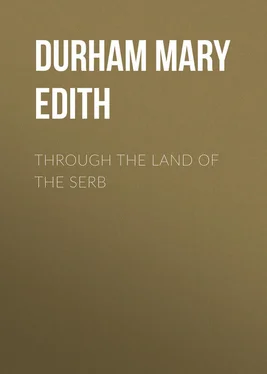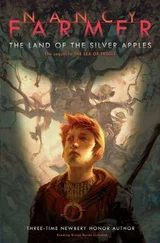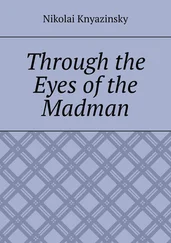Mary Durham - Through the Land of the Serb
Здесь есть возможность читать онлайн «Mary Durham - Through the Land of the Serb» — ознакомительный отрывок электронной книги совершенно бесплатно, а после прочтения отрывка купить полную версию. В некоторых случаях можно слушать аудио, скачать через торрент в формате fb2 и присутствует краткое содержание. Жанр: foreign_antique, foreign_prose, на английском языке. Описание произведения, (предисловие) а так же отзывы посетителей доступны на портале библиотеки ЛибКат.
- Название:Through the Land of the Serb
- Автор:
- Жанр:
- Год:неизвестен
- ISBN:нет данных
- Рейтинг книги:3 / 5. Голосов: 1
-
Избранное:Добавить в избранное
- Отзывы:
-
Ваша оценка:
- 60
- 1
- 2
- 3
- 4
- 5
Through the Land of the Serb: краткое содержание, описание и аннотация
Предлагаем к чтению аннотацию, описание, краткое содержание или предисловие (зависит от того, что написал сам автор книги «Through the Land of the Serb»). Если вы не нашли необходимую информацию о книге — напишите в комментариях, мы постараемся отыскать её.
Through the Land of the Serb — читать онлайн ознакомительный отрывок
Ниже представлен текст книги, разбитый по страницам. Система сохранения места последней прочитанной страницы, позволяет с удобством читать онлайн бесплатно книгу «Through the Land of the Serb», без необходимости каждый раз заново искать на чём Вы остановились. Поставьте закладку, и сможете в любой момент перейти на страницу, на которой закончили чтение.
Интервал:
Закладка:
Plenty of tobacco is grown in the neighbourhood. In the autumn the cottages are festooned with the big leaves drying in the sun, and you may see Albanians, sitting on their doorsteps, shredding up the fragrant weed with a sharp knife into long, very fine strips till it looks like a bunch of hair, shearing through a large pile swiftly, with machine – like regularity and precision. Tobacco is a cheap luxury, and I am told Montenegrin tobacco is good. Almost every man in Montenegro smokes from morning till night, generally rolling up the next cigarette before the last is finished.
The town possesses a burgomaster, a post-office, a steamboat office, a Palace, and an inn, which provides a good dinner on market days. It is a clean, prosperous, friendly, and very simple-minded place – I did not realise how simple-minded till I spent an afternoon sitting on the wall by the river, drawing the baker's shop, with some twenty Montenegrins sitting round in a crimson and blue semicircle. It was in the days when I knew nothing of the language, and the Boer War was as yet unfinished. I drew, and my friend talked. A youth in Western garb acted as interpreter. He ascertained whence we had come, and then remarked airily, "Now, I come from Hungary, and I am walking to the Transvaal. This man," pointing out a fine young Montenegrin, "is coming with me!" Stumbling, voluble and excited, in very broken German, he unfolded their crazy plan. They were both brave men and exceedingly rich. "I have two thousand florins, and a hundred more or less makes no difference to him," kept cropping up like the burden of a song. Their families had wept and prayed, but had failed to turn them from their purpose. They were going to walk to the Transvaal. "But you can't," we said. He was hurt. "Of course not all the way," he knew that. They had meant to walk across Albania to Salonika, but the Consul at Skodra had put a stop to this dangerous scheme. Now they were going by sea from Cattaro to Alexandria, and thence, also by sea, to Lorenzo Marques. After this, they should "walk to the Transvaal." "Why don't you walk from Alexandria?" we asked. He answered quite seriously that they had thought of this, but they had been told there was a tribe of Arabs in the centre of Africa even more ferocious than the Albanians, so, though they were of course very brave men, they thought on the whole they preferred the boat. When they arrived, they meant to fight on whichever side appeared likely to win, and then they were going to pick up gold. We thought it our duty to try and dissuade them from their wild-goose chase, but our efforts were treated with scorn. "What can you do? You speak very little German, and your friend nothing but Servian." "No, he doesn't," said the Hungarian indignantly. "He speaks Albanian very well, and I – I know many languages. I speak Servian and Hungarian." The idea that a place existed where no one spoke these well-known tongues was to him most ridiculous, and the Montenegrin, to whom it was imparted, smiled incredulously. We urged the price of living and the cost of Machinery required in gold-mining. The first he did not believe; the second he thought very silly. The gold was there, and he was not such a fool as to require a machine with which to pick it up.
The Montenegrin, who had been bursting with a question for the last quarter of an hour, insisted on its being put. "Could he buy a good revolver in Johannesburg?" He waited anxiously for a reply. "You see," explained the Hungarian, "he must leave his in Montenegro." "But why? It looks a very good one." The Montenegrin patted his weapon lovingly; he only wished he could take it, it would be most useful, but … in order to reach the boat at Cattaro he must cross Austrian territory, and you are not allowed to carry firearms in Austria! He shook his head dolefully when we said that permission could surely be obtained. "No, this was quite impossible; under no circumstances could it be managed. You don't know what the Austrians are!" said the Hungarian mysteriously. The unknown land, the unknown tongues, the British, the Boers, the rumble-tumble ocean and the perils of the deep were all as nothing beside the difficulty of crossing the one narrow strip of Austrian land. We told him revolvers were plentiful in Johannesburg, and the prospect of finding home comforts cheered him greatly. We parted the best of friends.
From Rijeka the road rises rapidly again, and strikes over the hills, winding through wild and very sparsely inhabited country. The mountain range ends abruptly, and we see the broad plains stretching away below us, with the white town of Podgoritza in the midst of it. The plain is very obviously the bed of the now shrunken lake of Skodra, and the water-worn pebbles are covered with but a thin layer of soil. But both maize and tobacco seem to do well upon it, and every year more land is taken into cultivation. The rough land is covered with wiry turf and low bushes, and swarms with tortoises which graze deliberately by the roadside. The river Moracha has cut itself a deep chasm in the loose soil between us and the town, and tears along in blue-green swirls and eddies. We have to overshoot the town to find the bridge, and we clatter into Podgoritza six or seven hours after leaving Cetinje, according to the weather and the state of the road.
Podgoritza is the biggest town in Montenegro, and has between five and six thousand inhabitants. It is well situated for a trading centre, for it is midway between Cetinje and Nikshitje, and is joined by a good road to Plavnitza, on the lake of Scutari, so is in regular steamboat communication with Skodra and with Antivari via Virbazar. Its position has always given it some importance. As a Turkish garrison town it was a convenient centre from which to invade Montenegro; to the Montenegrin it was part of his birthright – part of the ancient kingdom of Servia – and as such to be wrested from the enemy. It was the brutal massacre of twenty Montenegrins in and near the town in time of peace (October 1874) that decided the Montenegrins to support the Herzegovinian insurrection and declare war. Podgoritza was besieged and taken in October 1876. The walls of the old town were blown to pieces with guns taken from the Turks at Medun, and an entirely new town has since sprung up on the opposite side of the stream Ribnitza. Podgoritza (= "At the Foot of the Mountain"), if you have come straight from the West, is as amusing a place as you need wish to visit. It has not so many show places as Cetinje even, and its charm is quite undefinable. It consists in its varied human crowd, its young barbarians all at play, its ideas that date from the world's well – springs, subtly intermingled with Manchester cottons, lemonade in glass-ball-stoppered bottles, and other blessings of an enlightened present. The currents from the East and the West meet here, the old world and the new; and those to whom the spectacle is of interest, may sit upon the bridge and watch the old order changing.
The Montenegrin town of Podgoritza is clean and bright. The long wide main street of white stone, red-roofed shops with their gay wares, and the large open market square where the weekly bazaar is held, are full of life. Both street and market-place are planted with little trees, acacias and white mulberries; and the bright green foliage, the white road, the red roofs, the green shutters, the variety of costume, make an attractive scene in the blaze of the Southern sun. Across the gold-brown plain rise the blue mountains where lies that invisible line the frontier. The slim minarets of the old Turkish town shoot up and shimmer white on sky and mountain; the river Ribnitza flows between the old town and the new, and over the bridge passes an endless stream of strange folk, the villagers of the plain and the half-wild natives of the Albanian mountains passing from the world of the Middle Ages to a place which feels, however faintly, the forces of the twentieth century. Bullock carts, with two huge wheels and basket-work tops, trail slowly past, groaning and screeching on their ungreased axles. Look well at the carts, for our own forefathers used them in the eleventh century, and they appear in the Harleian MSS.
Читать дальшеИнтервал:
Закладка:
Похожие книги на «Through the Land of the Serb»
Представляем Вашему вниманию похожие книги на «Through the Land of the Serb» списком для выбора. Мы отобрали схожую по названию и смыслу литературу в надежде предоставить читателям больше вариантов отыскать новые, интересные, ещё непрочитанные произведения.
Обсуждение, отзывы о книге «Through the Land of the Serb» и просто собственные мнения читателей. Оставьте ваши комментарии, напишите, что Вы думаете о произведении, его смысле или главных героях. Укажите что конкретно понравилось, а что нет, и почему Вы так считаете.












